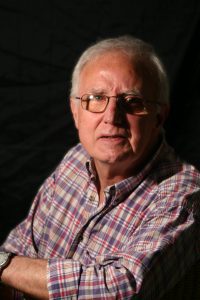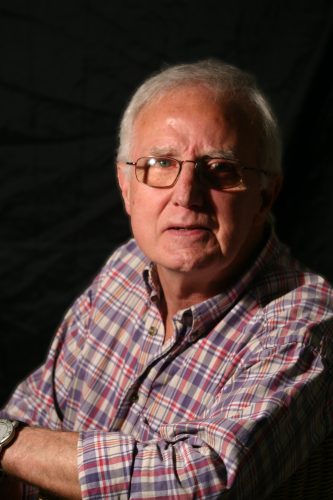Meet the Irregulars: Bill Kirton
R. B. Wood


Thirteen Questions with BILL KIRTON
I was going to say both, but that would be misleading. The actual writing is exhilarating because I feel I’m out of myself, I inhabit the characters, I feel I’m with them, in whatever place or time they are. It takes a lot of energy and yet afterwards, the fact that I’ve done it, I’ve resolved the issues, created a scene (or more), leads not to exhaustion but to elation.
- What are common traps for aspiring writers?
The main one is not trusting their own voice. By that, I mean that many think they ought to be writing ‘Literature’. I’m not using that as a derogatory term, but it can lead to artificiality, overblown images and/or expressions, pretentious observations, a completely unnatural use of language. One aspect of that is trying to mimic the style of their own favourite writers. By all means admire quality writing but remember that it takes many forms.
- Did you ever consider writing under a pseudonym?
Not really, although having written in different genres (modern crime, historical crime, romance, satire, fantasy, adventure) I sometimes wonder whether I owe it to my readers to signal that I’m doing something different. And there’s one thing that did make me think I should use a different name. When I wanted to check my books on Amazon, I used my name as a search term, whereupon Amazon asked ‘Did you mean Bell Kittens’?
- Do you think someone could be a writer if they don’t feel emotions strongly?
‘Feel’ is the important word, there. We can be as cerebral as we like but, in the end, a story calls for involvement . You can instruct and ‘educate’ a reader but, in the end, you want him/her to be moved, to care about someone or something and if you don’t feel and care yourself, you’re fumbling in the dark.
- What other authors are you friends with, and how do they help you become a better writer?
I find the process of reading so absorbing that each book I read feels like I’m listening to either a friend or someone I’d like to be a friend. It’s also in the nature of the profession to know lots of other authors and they always have variations on the way I think myself about the whole business. In terms of helping me, I’ve learned lots from simply reading their works but, in the context of the Word Count Podcast, it’s my collaborations with Eden Baylee that have taught me most about writing. Whether I start the story, or have to pick up from Eden’s start, it feels as if the characters are separate from us – in a way, independent. They’ve moved in different, often unexpected directions from when I was last dealing with them, so they become more complex characters then they were when they were just ‘mine’. It’s very complicated but it’s something I’d recommend as an experiment.
- If you could tell your younger writing self anything, what would it be?
Enjoy your writing but work hard at learning the non-writerly bits of the job, i.e. promotional work, marketing. And don’t expect to earn a living from it. But still do it.
- What’s the best way you’ve found to market your books?
See the previous answer. My direct answer to this question is ‘I have no idea’. I’ve had excellent reviews, kind comments from readers, and sound advice from successful fellow writers but I’m hopeless at it.
- What kind of research do you do, and how long do you spend researching before beginning a book?
It obviously varies from book to book. With my Jack Carston series, there was a lot of work on forensic techniques, policing methods, etc. before the first one but, thereafter, the characters were established and could drive the narrative themselves. Then I turned to the mid 19thcentury and figurehead carving, so that meant I needed historical information (and I also took wood carving classes – and still enjoy carving as a hobby). There was also a bit of self-indulgence there because, to get the feel of being on a fully rigged tall ship, I joined the crew of the Christian Radich as a paying member and sailed across the North Sea from Oslo to Edinburgh. That book was The Figureheadand, in the sequel to it (The Likeness), there was a travelling theatre company so I used the knowledge of 19thcentury theatre which I’d gained from my academic doctorate research on the plays of Victor Hugo.
- Do you view writing as a kind of spiritual practice?
It never occurs to me to think that that’s what it is but it really is. You move out of the dimension of the present and inhabit the minds and world of fictional figures and places. Images, symbols, meanings, explanations all occur to you in and for the context of this as yet non-existent world, so you disappear into it. In a way, it’s a terrific sort of therapy, an antidote to the world of political stupidity.
- What’s the most difficult thing about writing characters from the opposite sex?
This will probably sound artificial but, while I recognize that (as a generalization) men and women do think differently and can be stereotyped, I’ve never believed that they don’t fundamentally share very many common beliefs and characteristics. In my latest book (The Likeness), the central female character, Helen, having a fierce individual persona and lots of determination (and being stuck in Victorian Scotland with its rigid, gender-specific conventions) quite often disagreed with me and did things which made my life difficult. (See also next answer.)
- What was your hardest scene to write?
The Likenesscame about because several readers insisted that I write a sequel to The Figureheadmainly because they wanted to know how the romance between John and Helen developed. The final scene of the book provides the answer and I had to rewrite it six times – mainly because Helen wasn’t totally satisfied with any of the first five compromises I suggested. In the end, luckily, she and I came to an agreement, but only after a prolonged struggle.
- Do you read your book reviews? How do you deal with bad or good ones?
Yes, because all opinions are useful. I’ve been lucky, nearly all of mine have been kind so far. The only ones that disappoint are those that say more about the reviewer than the book. For one of my crime novels, which involved a nasty murder (as such books tend to), a reviewer ‘questioned the writer’s psyche’ and said it ‘creeped her out’ that I also wrote childrens’ books, while another gave a book one star because Amazon had sent her a different book from the one she’d ordered. But there’s nothing one can do about things like that, and one learns a lot from people’s opinions
- How long on average does it take you to write a book?
There’s no such thing as ‘average’. Almost all of my modern crime novels took about 10 months for a first draft, then a couple of extra months for editing and proofing. The Likeness, however, took 4 years. (Thanks, Helen.)
BIO
Bill Kirton was born in Plymouth, England, studied French at Exeter University and graduated in 1962. While teaching at Hardye’s School, Dorchester, he started his PhD on the theatre of Victor Hugo and was a lecturer at Aberdeen University from 1968 to 1989.
He’s also been a voice-over artist, TV presenter and has extensive experience of acting and directing. His directing credits include many French language plays as well as works by Shakespeare, Orton, Beckett and Ionesco. He spent a sabbatical year at the University of Rhode Island Theater Department, which commissioned translations of 3 Molière plays from him, one of which he directed himself. The script also won third prize in the British Comparative Literature Association’s Annual Translation competition, 1999.
Bill wrote and performed songs and sketches in revues at the Edinburgh Festival Fringe, stage plays, two of which were commissioned by Aberdeen Children’s Theatre, and radio plays for the BBC, two of which were also broadcast in Australia.
Since the late 1990s, his writing has concentrated on prose fiction. He has written many short stories and ten novels, three of which have won awards, with another being long-listed for the Rubery International Book Award.
Bill has held posts as a Royal Literary Fund Writing Fellow at universities in Aberdeen, Dundee and St Andrews and, since 2015, has been organiser of a Scotland-wide scheme which places professional writers in schools to help students with the transition to writing at university. He still gives workshops in schools from Orkney to Dundee as part of the scheme and he’s written five books in Pearson Educational’s ‘Brilliant’ series on study, writing and workplace skills. Bill also co-authored ‘Just Write’ for Routledge.
Website (and blog): http://www.billkirton.com
Facebook pages: https://www.facebook.com/profile.php?id=620980849 https://www.facebook.com/bill.kirton/
Twitter: @carver22


